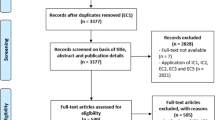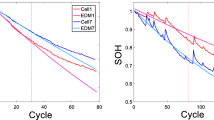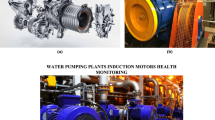Abstract
Attracted by the advantages of support vector regression and incremental learning approach, it is proposed in this work that an incremental support vector regression (ISVR) model optimized by particle swarm optimization (PSO) algorithm, and some improvements are made to be more suitable for sensor faults on-line diagnosis. To reducethe training time of ISVR model, an optimal training subset (OTS) method is adopted to reduce the size of training data set of the model. Then, in order to solve the problem of slow convergence of standard PSO algorithm, an incremental PSO (IPSO) algorithm is proposed to accelerate the model convergence through adjusting the inertial weight of each particle, which is gained by comparing the current position of each particle and the optimal position of the last incremental training. Based on the above improvements, a hybrid model, IPSO-OTS-ISVR model is presented finally. Experimental results based on actual operational data of a gas turbine shows that, under the premise of ensuring accuracy, the proposed IPSO-OTS-ISVR has much better performance in model response time and convergence performance over the comparison models. The experimental results based on an UCI data set indicate that the proposed hybrid model can also be extended to solve other prediction problems.








Similar content being viewed by others
References
Qin SJ, Li W (2001) Detection and identification of faulty sensors in dynamic processes. AICHE J 47:1581–1593. https://doi.org/10.1002/aic.690470711
Li J, Ying Y (2018) A method to improve the robustness of gas turbine gas-path fault diagnosis against sensor faults. IEEE Trans Reliab 67:3–12. https://doi.org/10.1109/TR.2017.2695482
Yang H, Mao ZH, Jiang B (2006) Model-based fault tolerant control for hybrid dynamic systems with sensor faults. Zidonghua Xuebao/Acta Autom Sin 32:680–685
Lu F, Chen Y, Huang J, Zhang D, Liu N (2014) An integrated nonlinear model-based approach to gas turbine engine sensor fault diagnostics. Proc Inst Mech Eng Part G J Aerosp Eng 228:2007–2021. https://doi.org/10.1177/0954410013511596
Hwang I, Kim S, Kim Y, Seah CE (2010) A survey of fault detection, isolation, and reconfiguration methods. IEEE Trans Control Syst Technol 18:636–653. https://doi.org/10.1109/TCST.2009.2026285
Zhang X, Zhang Q, Sonti N (2011) Diagnosis of process faults and sensor faults in a class of nonlinear uncertain systems. J Syst Eng Electron 22:22–32. https://doi.org/10.3969/j.issn.1004-4132.2011.01.003
Sharifi R, Langari R (2013) Sensor fault diagnosis with a probabilistic decision process. Mech Syst Signal Process 34:146–155. https://doi.org/10.1016/j.ymssp.2012.07.014
Zhang HG, Zhang S, Yin YX (2015). Adaptive fault diagnosis for continuous time-delay repetitive system subject to sensor fault. Int Conf Adv Mechatron Syst ICAMechS 456–460
Kobayashi T, Simon DL (2005) Evaluation of an enhanced bank of Kalman filters for in-flight aircraft engine sensor fault diagnostics. J Eng Gas Turbines Power 127:497–504. https://doi.org/10.1115/1.1850505
Pourbabaee B, Meskin N, Khorasani K (2013). Multiple-model based sensor fault diagnosis using hybrid kalman filter approach for nonlinear gas turbine engines. Proc am control Conf 4717–4723. https://doi.org/10.1109/acc.2013.6580567
Rahme S, Meskin N (2015) Adaptive sliding mode observer for sensor fault diagnosis of an industrial gas turbine. Control Eng Pract 38:57–74. https://doi.org/10.1016/j.conengprac.2015.01.006
Yang Y, Ding SX, Li L (2015) On observer-based fault detection for nonlinear systems. Syst Control Lett 82:18–25. https://doi.org/10.1016/j.sysconle.2015.05.004
Borguet S, Léonard O (2009) Coupling principal component analysis and Kalman filtering algorithms for on-line aircraft engine diagnostics. Control Eng Pract 17:494–502. https://doi.org/10.1016/j.conengprac.2008.09.008
Yang Q, Li S, Cao Y (2019) Multiple model-based detection and estimation scheme for gas turbine sensor and gas path fault simultaneous diagnosis. J Mech Sci Technol 33:1959–1972. https://doi.org/10.1007/s12206-019-0346-6
Sadough Vanini ZN, Khorasani K, Meskin N (2014) Fault detection and isolation of a dual spool gas turbine engine using dynamic neural networks and multiple model approach. Inf Sci (Ny) 259:234–251. https://doi.org/10.1016/j.ins.2013.05.032
Sina Tayarani-Bathaie S, Sadough Vanini ZN, Khorasani K (2014) Dynamic neural network-based fault diagnosis of gas turbine engines. Neurocomputing 125:153–165. https://doi.org/10.1016/j.neucom.2012.06.050
Sadough Vanini ZN, Meskin N, Khorasani K (2014) Multiple-model sensor and components fault diagnosis in gas turbine engines using autoassociative neural networks. J Eng Gas Turbines Power 136:1–16. https://doi.org/10.1115/1.4027215
Duan S, Li Q, Zhao Y (2011). Fault diagnosis for sensors of aero-engine based on improved least squares support vector regression. In: proceedings - 2011 8th international conference on fuzzy systems and knowledge discovery, FSKD 2011. IEEE, pp 1962–1966
Deng F, Guo S, Zhou R, Chen J (2017) Sensor multifault diagnosis with improved support vector machines. IEEE Trans Autom Sci Eng 14:1053–1063. https://doi.org/10.1109/TASE.2015.2487523
Chapelle O (2002) Choosing multiple parameters for support. Mach Learn 46:131–159
Huang CM, Lee YJ, Lin DKJ, Huang SY (2007) Model selection for support vector machines via uniform design. Comput Stat Data Anal 52:335–346. https://doi.org/10.1016/j.csda.2007.02.013
Lins ID, Moura MDC, Zio E, Droguett EL (2012) A particle swarm-optimized support vector machine for reliability prediction. Qual Reliab Eng Int 28:141–158. https://doi.org/10.1002/qre.1221
Lin SW, Ying KC, Chen SC, Lee ZJ (2008) Particle swarm optimization for parameter determination and feature selection of support vector machines. Expert Syst Appl 35:1817–1824. https://doi.org/10.1016/j.eswa.2007.08.088
Chen KY (2007) Forecasting systems reliability based on support vector regression with genetic algorithms. Reliab Eng Syst Saf 92:423–432. https://doi.org/10.1016/j.ress.2005.12.014
Zhao W, Tao T, Zio E (2015) System reliability prediction by support vector regression with analytic selection and genetic algorithm parameters selection. Appl Soft Comput J 30:792–802. https://doi.org/10.1016/j.asoc.2015.02.026
Zhao W, Tao T, Zio E, Wang W (2016) A novel hybrid method of parameters tuning in support vector regression for reliability prediction: particle swarm optimization combined with analytical selection. IEEE Trans Reliab 65:1393–1405. https://doi.org/10.1109/TR.2016.2515581
Che J, Wang J, Tang Y (2012) Optimal training subset in a support vector regression electric load forecasting model. Appl Soft Comput J 12:1523–1531. https://doi.org/10.1016/j.asoc.2011.12.017
Shi Y, Eberhart RC (1998). Parameter selection in particle swarm optimization. In: lecture notes in computer science (including subseries lecture notes in artificial intelligence and lecture notes in bioinformatics). pp 591–600
Che JX (2013) Support vector regression based on optimal training subset and adaptive particle swarm optimization algorithm. Appl Soft Comput J 13:3473–3481. https://doi.org/10.1016/j.asoc.2013.04.003
Chauhan P, Deep K, Pant M (2013) Novel inertia weight strategies for particle swarm optimization. Memetic Comput 5:229–251
Li M, Chen H, Shi X, Liu S, Zhang M, Lu S (2019) A multi-information fusion “triple variables with iteration” inertia weight PSO algorithm and its application. Appl Soft Comput 84:105677
Taherkhani M, Safabakhsh R (2016) A novel stability-based adaptive inertia weight for particle swarm optimization. Appl Soft Comput 38:281–295
Sain SR, Vapnik VN (1996). The nature of statistical learning theory. Springer science and business media
Scholkopf B, Smola AJ (2001) Learning with kernels: support vector machines, regularization, optimization, and beyond. MIT Press, Cambridge
Kennedy J, Eberhart R (1995). Particle swarm optimization. In: proceedings of IEEE international conference on neural networks. pp 1942–1948 vol.4
Lu F, Huang J, Xing Y (2012) Fault diagnostics for turbo-shaft engine sensors based on a simplified on-board model. Sensors (Switzerland) 12:11061–11076. https://doi.org/10.3390/s120811061
Tang L, Zhang X, DeCastro JA et al (2010) A unified nonlinear adaptive approach for detection and isolation of engine faults. Proc ASME Turbo Expo 3:143–153. https://doi.org/10.1115/GT2010-22642
Coraddu A, Oneto L, Ghio A, et al (2014). Machine learning approaches for improving condition? Based maintenance of naval propulsion plants. Proc Inst Mech Eng Part M J Eng Marit Environ 230:136–153
Acknowledgments
This work is supported by National Science and Technology Major Project (No.2017-I-0002-0002).
Author information
Authors and Affiliations
Corresponding author
Additional information
Publisher’s note
Springer Nature remains neutral with regard to jurisdictional claims in published maps and institutional affiliations.
Rights and permissions
About this article
Cite this article
Zhang, D., Xiang, W., Cao, Q. et al. Application of incremental support vector regression based on optimal training subset and improved particle swarm optimization algorithm in real-time sensor fault diagnosis. Appl Intell 51, 3323–3338 (2021). https://doi.org/10.1007/s10489-020-01916-9
Published:
Issue Date:
DOI: https://doi.org/10.1007/s10489-020-01916-9




